
The Battle of Borodino took place near the village of Borodino on 7 September [O.S. 26 August] 1812 during Napoleon's invasion of Russia. The Grande Armée won the battle against the Imperial Russian Army but failed to gain a decisive victory and suffered tremendous losses. Napoleon fought against General Mikhail Kutuzov, whom the Emperor Alexander I of Russia had appointed to replace Barclay de Tolly on 29 August [O.S. 17 August] 1812 after the Battle of Smolensk. After the Battle of Borodino, Napoleon remained on the battlefield with his army; the Imperial Russian forces retreated in an orderly fashion southwards. Because the Imperial Russian army had severely weakened the Grande Armée, they allowed the French occupation of Moscow since they used the city as bait to trap Napoleon and his men. The failure of the Grande Armée to completely destroy the Imperial Russian army, in particular Napoleon's reluctance to deploy his guard, has been widely criticised by historians as a huge blunder, as it allowed the Imperial Russian army to continue its retreat into territory increasingly hostile to the French. Approximately a quarter of a million soldiers were involved in the battle, and it was the bloodiest single day of the Napoleonic Wars.

Prince Mikhail Illarionovich Golenishchev-Kutuzov was a Field Marshal of the Russian Empire. He served as a military officer and a diplomat under the reign of three Romanov monarchs: Empress Catherine II, and Emperors Paul I and Alexander I. Kutuzov was shot in the head twice while fighting the Turks and survived the serious injuries seemingly against all odds. He defeated Napoleon as commander-in-chief using attrition warfare in the Patriotic war of 1812. Alexander I, the incumbent Tsar during Napoleon's invasion, would write that he would be remembered amongst Europe's most famous commanders and that Russia would never forget his worthiness.

The Xianfeng Emperor, or by temple name Emperor Wenzong of Qing (清文宗), given name Yizhu (奕詝), was the eighth Emperor of the Qing dynasty, and the seventh Qing emperor to rule over China proper, reigned from 1850 to 1861. During his reign, the Qing dynasty experienced several wars and rebellions including the Taiping Rebellion, Nian Rebellion, and Second Opium War. He was the last Chinese emperor to have authoritarian and total executive ruling power. After his death, the Qing government was controlled by Empress Dowager Cixi.

The Daoguang Emperor, also known by his temple name Emperor Xuanzong of Qing, born Mianning, was the seventh Emperor of the Qing dynasty, and the sixth Qing emperor to rule over China proper, reigning from 1820 to 1850. His reign was marked by "external disaster and internal rebellion." These included the First Opium War and the beginning of the Taiping Rebellion which nearly brought down the dynasty. The historian Jonathan Spence characterizes the Daoguang Emperor as a "well meaning but ineffective man" who promoted officials who "presented a purist view even if they had nothing to say about the domestic and foreign problems surrounding the dynasty."

The Jiaqing Emperor, also known by his temple name Emperor Renzong of Qing, born Yongyan, was the sixth emperor of the Manchu-led Qing dynasty, and the fifth Qing emperor to rule over China proper, from 1796 to 1820. He was the 15th son of the Qianlong Emperor. During his reign, he prosecuted Heshen, the corrupt Manchu favorite of his father, and attempted to restore order within the Qing Empire while curbing the smuggling of opium into China.
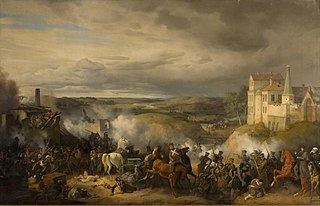
The Battle of Maloyaroslavets took place on 24 October 1812 as part of the French invasion of Russia. It was Kutuzov's decisive battle to force Napoleon to retreat northwest over Mozhaisk to Smolensk on the devastated route of his advance with a higher probability of starvation. Kutuzov's next attack against the remnants of the Grande Armee, the Battle of Krasnoi, began on 15 November 1812, 3 weeks later.

The Battle of Krasnoi (Krasny) was a series of skirmishes fought from 15 to 18 November 1812 during the final stage of Napoleon's retreat from Moscow. In this engagement the Russians under General Kutuzov inflicted heavy losses on the remnants of the Grande Armee, which was severely weakened by attrition. Neither Kutuzov nor Napoleon allowed this clash to escalate into a full battle. Throughout the four days of combat, Napoleon sought to rush his troops, extended in a 50-mile line of march, past the Russians, who were positioned parallel to the highway. Despite the vast superiority of the Russian army, Kutuzov refrained from launching a full offensive as he did not want to risk a pitched battle against Napoleon.
Temeraire is a series of nine alternate history fantasy novels written by American author Naomi Novik. The novels follow the adventures of Captain William Laurence and his dragon, the eponymous Temeraire, and reimagine events of the Napoleonic Wars with "an air force of dragons, manned by crews of aviators". His Majesty's Dragon, the first entry in the series, won the Compton Crook Award in 2007 and was nominated for the Hugo Award for Best Novel the same year. Temeraire: In the Service of the King, an omnibus volume collecting the first three novels, won the Locus Award for Best First Novel in 2007. Temeraire was nominated for the Hugo Award for Best Series in 2017.
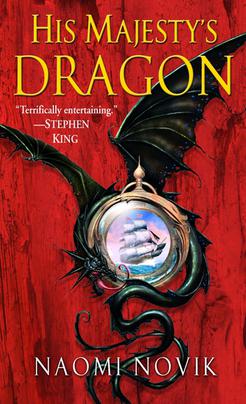
His Majesty's Dragon, published in the UK as Temeraire, is the first novel in the Temeraire alternate history/fantasy series by American author Naomi Novik. The story is set during an alternate-history version of the Napoleonic Wars, in which dragons not only exist but are used as a staple of aerial warfare in Asia and Europe. The dragons of the story are portrayed as sapient and intelligent, capable of logical thought and human speech. The series centers primarily on events involving Temeraire and his handler, Will Laurence.
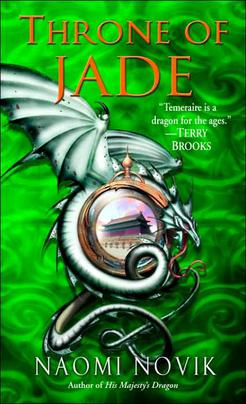
Throne of Jade is the second novel in the Temeraire alternate history/fantasy series written by American author Naomi Novik. It was published by Del Rey first in the United States on April 25, 2006, and was published in the United Kingdom in August 2007 by Voyager.

Black Powder War is the third novel in the Temeraire alternate history/fantasy series by American author Naomi Novik. The novel was first published by Del Rey in the United States on May 30, 2006, and by Voyager in the United Kingdom in August 2007.

The Battle of Schöngrabern, also known as the Battle of Hollabrunn, was an engagement in the Napoleonic Wars during the War of the Third Coalition, fought on 16 November 1805 near Hollabrunn in Lower Austria, four weeks after the Battle of Ulm and two weeks before the Battle of Austerlitz.

Empire of Ivory is the fourth novel in the Temeraire alternate history/fantasy series by American author Naomi Novik. Set in Africa, the novel follows William Laurence and his dragon Temeraire's search for a cure to the disease that has paralyzed the dragon community. Novik visited southern Africa in search of places in the fourth novel.

1945 is an alternate history novel by Michigan economics professor Robert Conroy, an author of alternate history novels, such as 1901 and 1862. It was first published in trade paperback and ebook form by Ballantine Books in May 2007. In the novel's point of divergence, the Kyūjō coup overthrew Japanese Emperor Hirohito and so World War II resumed until 1946.

Victory of Eagles is the fifth novel in the Temeraire alternate history/fantasy series by American author Naomi Novik. The series follows the actions of William Laurence and his dragon, Temeraire.

Tongues of Serpents is the sixth novel in the Temeraire alternate history/fantasy series by American author Naomi Novik. This installment follows William Laurence and his dragon, Temeraire's adventures in Australia.
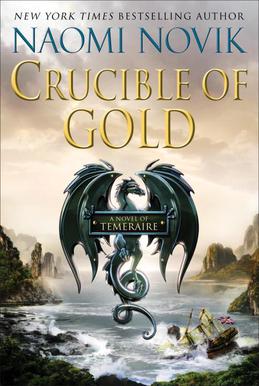
Crucible of Gold is the seventh novel in the Temeraire alternate history/fantasy series by American author Naomi Novik. This installment features the adventures of William Laurence and his dragon, Temeraire, in South America.
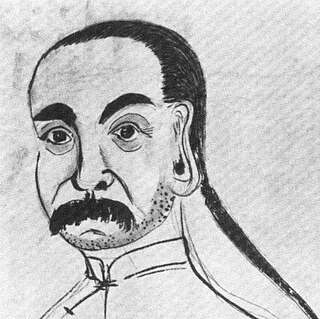
The Eight Trigrams uprising of 1813 broke out in China under the Qing dynasty. The rebellion was started by some elements of the millenarian Tianli Sect (天理教) or Heavenly Principle Sect, which was a branch of the White Lotus Sect. Led by Lin Qing and Li Wencheng, the revolt occurred in the Zhili, Shandong, and Henan provinces of China.

League of Dragons is the ninth and final novel in the Temeraire alternate history/fantasy series by American author Naomi Novik. It was released by Del Rey Books on June 14, 2016.

French Emperor Napoléon Bonaparte's Grande Armée occupied Moscow from 14 September to 19 October 1812 during the Napoleonic Wars. It marked the summit of the French invasion of Russia. During the occupation, which lasted 36 days, the city was devastated by fire and looted by both Russian peasants and the French.



















